VE Day celebrations
We had a great time dressing up and celebrating our very own Victory in Europe day on Friday.
It was a fantastic way to end our ‘Class Novel’ topic and we all had a great time. As well as having lots of fun at our VE day party, we also reflected on all the great learning we’ve enjoyed over the last eight weeks. It was particularly useful to hear which aspects of the topic the children have enjoyed the most and why.
Ask your child what they learnt over the course of this big topic and discuss the relevance/importance of this learning.
Also, discuss their views on the class novel they read. Did they enjoy it? Why? Did they empathise with the characters? Why?
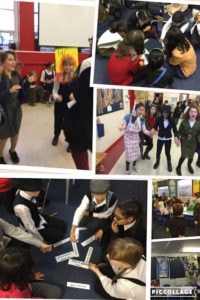
Guided Reading
Due to STEM week, guided reading this week will not be happening as usual. On Friday, all children were asked to have read to their target page by Tuesday. Please don’t worry if your child doesn’t quite manage to read to their target page – I appreciate that it may be difficult to manage on top of homework and general life (although most groups will have had their target page set on Monday and Tuesday last week giving them almost a week to read).
When changes to guided reading are made it is always to improve learning. Although your child may generally read on a set day (eg Tuesday) this will change from time to time. Please don’t allow your child to be anxious about not having read to their target page – this does not make reading enjoyable. Instead, encourage them to read to their target page soon after they are given it.
Thank you.
Anti-bullying tips
Thank you, Emma (Year 2) for recommending CBBC for lots of Anti-Bullying Week advice.

Creative homework review
As always, we reviewed our homeworks as a class this week. The standard of homework is always high in Y5; I love it. Seeing how children respond to creative homeworks is one of my favourite things. It gives me lots of teaching ideas, too – thanks Y5!
This week, we were particularly impressed by these pieces:
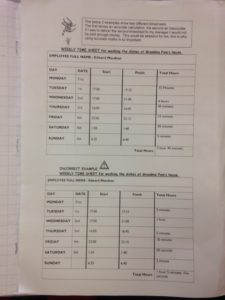 Edward’s pot-washing time sheet.
Edward’s pot-washing time sheet.
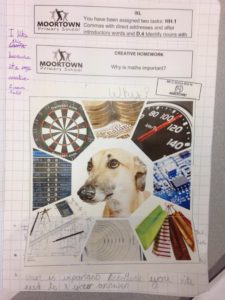 Sam’s collage of maths in everyday life.
Sam’s collage of maths in everyday life.
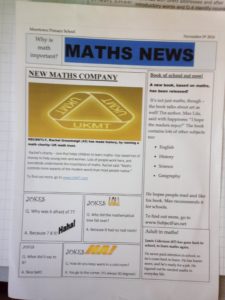 Pippa’s news report – love the jokes, Pippa!
Pippa’s news report – love the jokes, Pippa!
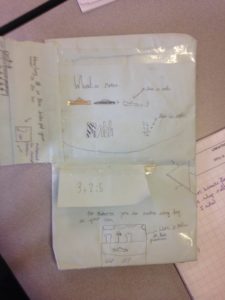 Megan’s maths game.
Megan’s maths game.
Topic themed English learning
This week, in English, we’ve been learning about poetry. We started out by comparing and contrasting a wide range of poems (some well known, some less familiar) and then began to unpick the poets’ use of figurative language. As it was Remembrance Day on Friday, and our Class Novel topic is heavily linked to WW2, we learnt ‘In Flanders Field‘ off by heart – ask your child if they can recite it to you!
Then, on Friday, we split into groups to perform the poem. Every group captured the mood and were able to portray this through their performance. Each group incorporated actions into their performance and one group even had the subtle, faint whistle of a bird in the background.
Here are some action shots…
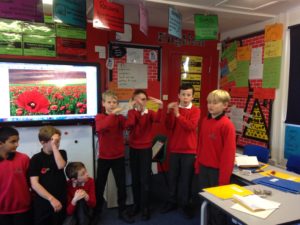
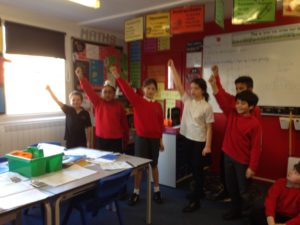
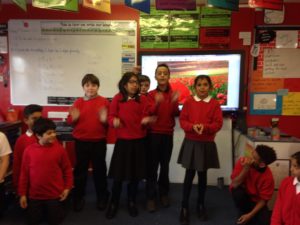
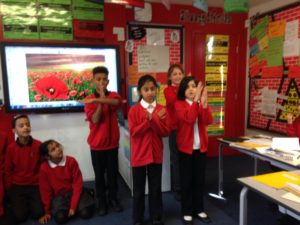
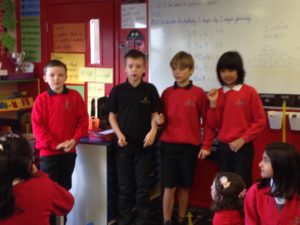
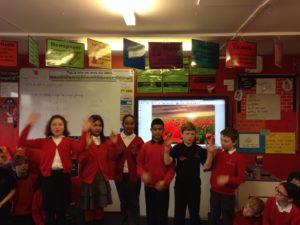
‘Power for good’
Next week is national Anti-Bullying Week.

The theme this year is ‘Power for Good‘ with the following key aims:
- To support children and young people to use their Power for Good – by understanding the ways in which they are powerful and encouraging individual and collective action to stop bullying and create the best world possible.
- To help parents and carers to use their Power for Good – through supporting children with issues relating to bullying and working together with schools to stop bullying.
- To encourage all teachers, school support staff and youth workers to use their Power for Good– by valuing the difference they can make in a child’s life, and taking individual and collective action to prevent bullying and create safe environments where children can thrive.
Our school definition has recently been reviewed by the School Council and remains unchanged.
‘Bullying is when you hurt someone, physically or emotionally, several times on purpose.’
We also encourage children to use their ‘Power for Good’, if they were to experience or witness bullying, by using another STOP message, start telling other people.
In class, children will discuss these aspects of bullying:
- Our definition of bullying (above)
- Types of bullying – cyber-bullying and prejudice-based bullying related to gender, sexual orientation, race, religion and belief, special educational need and disability
- What to do if children experience bullying. The key message is to tell someone (start telling other people)
Recently the School Council responded to this question, ‘What would you do if you were bullied‘?
- ‘Start telling other people – tell someone who I trust and who I can talk to.’
- ‘I would tell someone I trust (family member, member of staff or friend).’
- ‘If I were bullied, I’d tell my parents, a friend, a teacher and if nothing changed I would phone ChildLine (08001111).’
- ‘I’d tell a teacher, maybe a friend and put in a worry in the ‘worry box’. Also, I’d tell a parent.’
- ‘I would tell anyone I trust: my friends, my mum or dad or a member of staff. They could sort it straight away.’
- ‘I’d tell my mummy and daddy.’
All classes have access to their class SEAL box or a whole school worry box where they can tell an adult any concerns about bullying or any other issues.
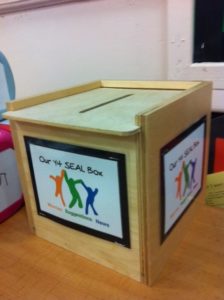
For further support, bullying resources can be found at…
- http://www.anti-bullyingalliance.org.uk/resources/disablist-bullying/resources-for-parents/
- http://www.childline.org.uk/explore/bullying/pages/bullying.aspx
- http://www.bullying.co.uk/advice-for-parents/
- http://www.youngminds.org.uk/for_parents/worried_about_your_child/bullying
Christmas dinner themed menu
Catering Leeds, our school meal provider, will be running a special Christmas themed menu on Thursday 15 December.
Please contact the office, by 30 November, if your child would like a school dinner on this day.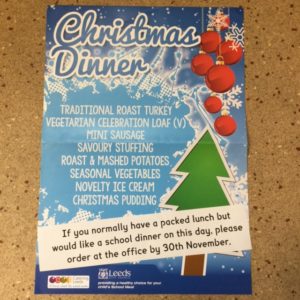
8 Rs for learning – our new SEAL theme
This half-term, we’re thinking about the ‘8 Rs for learning’. This theme is about promoting good learning behaviour for your child.
Each week, we’ll focus on different ‘Rs’. We use an animal to symbolise each ‘R’, which might help your child remember all eight – can your child remember which animal matches the correct ‘R’?
You can support your child at home – we’ve listed a few ideas to help you below. Ask us if you’ve any questions or comments.
Download top tips for promoting the 8Rs for good learning behaviour.
I take a safe risk.
Talk about the difference between a safe and unsafe risk. At school, we want your child to take a safe risk by having a go at answering, even if unsure; trying something new and attempting harder learning.
I take responsibility for my own learning.
Provide time and space at home so your child is able to organise themselves: their PE kit, reading book, homework, spellings and tables… Don’t organise everything for them!
Make a link between rights and responsibilities: your child has the right to a great education, but needs to be responsible for their own learning.
I respond to feedback.
Ask your child if they remember their ‘stars’ and ‘steps’ in English and Maths.
I can show I am ready to learn.
Make sure your child is at school for a prompt start of 08:50.
Make sure your child has had plenty of sleep so they are alert and ready to learn at all times.
Encourage your child to ask lots of questions – that shows they want to learn!
I am resourceful.
Encourage your child to be organised so they can play with a range of different toys.
Encourage your child to try new ways to solve a tricky problem.
I am resilient.
Encourage your child to keep going! Set a tricky challenge or puzzle for your child to do.
Encourage your child to think of different ways of doing things.
Don’t let your child win when they play a game – they need to experience losing, too!
Celebrate mistakes as opportunities to learn – be happy that your child found some learning hard and encourage them to ‘bounce back’ and learn from the experience.
I remember.
Make sure they have time to learn spellings, number bonds and times tables – a little practice daily is best.
Play memory games:
Kim’s game: show them objects for 30 seconds… can they remember all the objects?
Can they build up the sequence, ‘I went to the shop and I bought an apple’… ‘I went to the shop and I bought an apple and a bike.’… ‘I went to the shop and I bought an apple, a bike and a cucumber.’ etc … Take turns!
I reflect about my learning.
Talk with your child about what they’ve learnt, asking questions about:
how they learnt
why they learnt it
when they’ll use their learning
how they would teach this to someone else
what learning might link with what they’ve learnt today etc
Asking questions about WW2
Before half-term, we were fortunate enough to be able to email Mrs Weekes’ dad, who was evacuated from Newcastle during WW2, and ask him lots of questions about his experience.
Today, we received a response and were fascinated to hear all about it! However, there was a problem. Somehow, all the answers and questions had been jumbled up so we had to use our comprehension skills to match the questions to the answers. Once we’d managed to do this we studied the responses – it was very interesting. In particular, we were amazed at how little children were allowed to take with them: only some clothes!
Then, we thought about the characters in our class novel. Max and Anna are German refugees so we discussed the difference between refugees and evacuees (help at home by asking your child about this and discussing this topic in more detail). Finally, we pretended to be Max and asked some of our own questions.
Here are some pics:
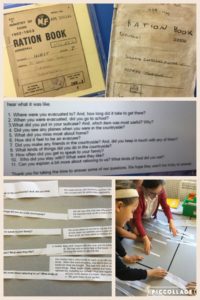
On behalf of all of Year 5, I must say a huge thank you to Mrs Weekes and her dad for answering our questions.
Athletics club and competition
There are places available on the athletics after-school club, starting after the half term, if your child would like to come along.
The club will run on Monday 31 October and Monday 07 November, 3.15-4.15, in preparation for a local competition on 23 November.
Please inform the office if your child would like to join. We particularly need girls to join the team.